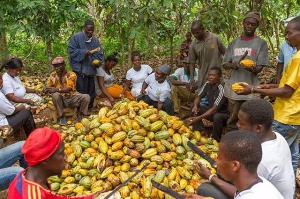After decades of enjoying government sponsored or subsidized support services, cocoa farmers in Ghana must now gear up to obtain critical support and extension services on commercial terms from the private sector, albeit with service quality assurance still provided by the state though COCOBOD.
However, the impending change over from government-sponsored support to commercialized support by the private sector is being accompanied by an initiative from COCOBOD which shows potential to triple cocoa farmers productivity and consequent earnings, thus enabling them to pay commercial rates for extension support services and still make far higher net incomes than they have been making, for any given level of state-guaranteed producer prices.
Under the new system being introduced the mass pruning and hand pollination services piloted and paid for last year by COCOBOD will, going forward, be provided by private sector service providers at commercial rates, just as government is pulling back from subsidizing the fertilizers and insecticides that it has customarily provided cocoa farmers.
However, farmers will expectedly be able to meet the resultant increased operating costs since COCBOD’s new productivity enhancement initiatives – centering around the mass pruning and hand pollination it introduced in 2018 – are generating dramatically improved levels of cocoa farmer productivity.
According to COCOBOD’s managing director, Joseph Boahen Aidoo, beneficiary farmers of the pilot phase of the new initiative are now averaging up to 20 bags of cocoa per hectare on the most fertile farms, up from just three bags previously. He points out that with one bag currently earning cocoa farmers GHc475, the extra revenue such farmers stand to make can easily pay for all their needed inputs at commercial prices and still leave them with far more profit than they have made in the past. “Its all about efficiency” he enthuses.
The pilot phase of the new initiative to enhance productivity, launched last year only covers about 100,000 hectares of Ghana’s 1.6 million hectares of cocoa farm land, but has provided a model for the rest. Increased productivity is crucial to Ghana’s cocoa industry’s contributions to foreign exchange earnings and the livelihoods of some 800,000 cocoa farming households, because an estimated 40 percent – some 700,000 hectares – of the country’s cocoa farmland has been rendered unproductive by a combination of disease and aged trees.
In recent years this has significantly lowered cocoa production from Ghana – the world’s second largest producer after Cote d’Ivoire – to well under 800,000 tons a year after achieving a peak in production of over one million tons about a decade ago. But with COCOBOD applying new initiatives, production has risen back to about 900,000 tons since 2017 and this is what is projected for the current crop season too.
The decision to resort to commercialized provision of farmer support services is primarily the result of the currently unfavourable economics faced by government. At the current world price of about US$2,200 per ton, COCOBOD is incurring a financing gap. This is because farmers are getting (the cedi equivalent of) US$1,700, and state sponsored service and input support adds on another US$700 per bag in further costs; COCOBOD needs an international markets price of at least US$2,400 a ton to break even. This year the financing gap will be about GHc1 billion down from GHc2.07 billion in 2018.
Importantly COCOBOD has established a cocoa farms database through which it should be able to monitor the supply and impact of private sector inputs and support services supply to farms on the database. For such farms COCOBOD will seek service and input suppliers willing to provide their goods and services to farmers on profit and have the costs deducted from the farmers at sales time and forwarded to the suppliers.
Business News of Saturday, 2 February 2019
Source: goldstreetbusiness.com













